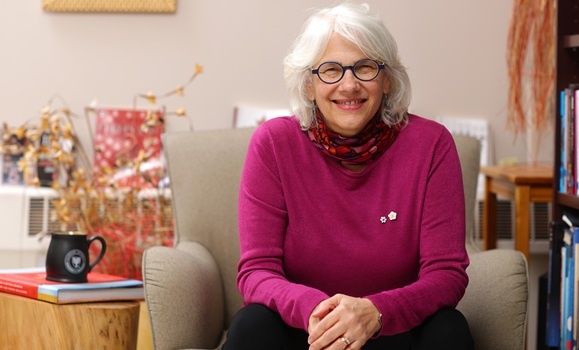Science
Dr. Françoise Baylis Steps Up as President of Royal Society of Canada

Dr. Françoise Baylis officially begins her term as the president of the Royal Society of Canada (RSC) on November 15, 2025. She will take the stage at the RSC’s Annual Gala in Montréal next week, marking a significant milestone in her career as a leading bioethicist. Dr. Baylis is renowned for her work addressing complex ethical issues in science and medicine, particularly through her role on the World Health Organization’s advisory committee on human-genome editing.
Her book, Altered Inheritance: CRISPR and the Ethics of Human Genome Editing, has significantly influenced global conversations on biotechnology. Throughout her career, Dr. Baylis has focused on promoting scientific advancements that prioritize the common good. Her research covers various topics, including reproductive ethics, genome editing, and public health.
Leading the RSC Through Global Challenges
Dr. Baylis will lead the RSC from 2025 to 2028, navigating the complexities of modern challenges where credible voices are vital for bridging research, policy, and public understanding. In a recent conversation, she emphasized the need for the RSC to expand its engagement with the public and to strengthen trust in expertise.
The RSC is involved in international initiatives such as the Science7 (S7) and Science20 (S20) groups, which aim to formulate science-based statements for consideration at the G7 and G20 Summits. Dr. Baylis expressed her intent to leverage her global connections to enhance the RSC’s contributions to these programs.
She believes that it is crucial for RSC members to be present in decision-making spaces, stating, “We need more of us to be in ‘the room where it happens,’” especially as public trust in expertise faces challenges.
Enhancing Public Engagement and Trust
During the COVID-19 pandemic, the RSC made significant strides in public engagement, reaching over 10,000 Canadians through webinars. Dr. Baylis aims to build on this momentum by optimizing the use of social media and increasing the dissemination of accessible commentaries. Many RSC members already contribute to public discourse through blogs, and she sees podcasts as another opportunity for outreach.
The RSC is well-equipped to provide evidence-based advice to government officials and the public. Dr. Baylis highlighted the organization’s successful response during the pandemic, citing the multi-year Task Force on COVID-19, which mobilized over 700 Canadians to produce numerous peer-reviewed reports and opinion pieces in major publications.
Addressing pressing issues such as artificial intelligence and climate change, Dr. Baylis noted the RSC’s commitment to ongoing research and discussion. A conference dedicated to AI is scheduled during this year’s Celebration of Excellence and Engagement in Montréal, reflecting the RSC’s proactive approach to emerging technologies.
Inspiring Future Generations
The RSC has made strides in engaging early-career researchers through its College of New Scholars, Artists and Scientists, established in 2014. This body recognizes the contributions of mid-career professionals and encourages the next generation of intellectual leaders to innovate and challenge existing paradigms.
As Dr. Baylis contemplates her presidency, she sets high expectations for both herself and her colleagues. She emphasizes the importance of knowledge production for the common good, especially during times of societal division. The RSC aims to not only celebrate excellence but also to enhance engagement with civil society and policymakers.
By leveraging its intellectual resources, the RSC is positioned to address contemporary challenges and contribute meaningfully to society. Dr. Baylis hopes to ensure that the knowledge produced by the Society is utilized to improve the world, reinforcing the vital role of academic expertise in shaping public policy and understanding.
-

 Education3 months ago
Education3 months agoBrandon University’s Failed $5 Million Project Sparks Oversight Review
-

 Science4 months ago
Science4 months agoMicrosoft Confirms U.S. Law Overrules Canadian Data Sovereignty
-

 Lifestyle3 months ago
Lifestyle3 months agoWinnipeg Celebrates Culinary Creativity During Le Burger Week 2025
-

 Health4 months ago
Health4 months agoMontreal’s Groupe Marcelle Leads Canadian Cosmetic Industry Growth
-

 Technology3 months ago
Technology3 months agoDragon Ball: Sparking! Zero Launching on Switch and Switch 2 This November
-

 Science4 months ago
Science4 months agoTech Innovator Amandipp Singh Transforms Hiring for Disabled
-

 Education3 months ago
Education3 months agoRed River College Launches New Programs to Address Industry Needs
-

 Technology4 months ago
Technology4 months agoGoogle Pixel 10 Pro Fold Specs Unveiled Ahead of Launch
-

 Business3 months ago
Business3 months agoRocket Lab Reports Strong Q2 2025 Revenue Growth and Future Plans
-

 Technology2 months ago
Technology2 months agoDiscord Faces Serious Security Breach Affecting Millions
-

 Education3 months ago
Education3 months agoAlberta Teachers’ Strike: Potential Impacts on Students and Families
-

 Science3 months ago
Science3 months agoChina’s Wukong Spacesuit Sets New Standard for AI in Space
-

 Education3 months ago
Education3 months agoNew SĆIȺNEW̱ SṮEȽIṮḴEȽ Elementary Opens in Langford for 2025/2026 Year
-

 Technology4 months ago
Technology4 months agoWorld of Warcraft Players Buzz Over 19-Quest Bee Challenge
-

 Business4 months ago
Business4 months agoNew Estimates Reveal ChatGPT-5 Energy Use Could Soar
-

 Business3 months ago
Business3 months agoDawson City Residents Rally Around Buy Canadian Movement
-

 Technology2 months ago
Technology2 months agoHuawei MatePad 12X Redefines Tablet Experience for Professionals
-

 Business3 months ago
Business3 months agoBNA Brewing to Open New Bowling Alley in Downtown Penticton
-

 Technology4 months ago
Technology4 months agoFuture Entertainment Launches DDoD with Gameplay Trailer Showcase
-

 Technology4 months ago
Technology4 months agoGlobal Launch of Ragnarok M: Classic Set for September 3, 2025
-

 Technology4 months ago
Technology4 months agoInnovative 140W GaN Travel Adapter Combines Power and Convenience
-

 Science4 months ago
Science4 months agoXi Labs Innovates with New AI Operating System Set for 2025 Launch
-

 Top Stories2 months ago
Top Stories2 months agoBlue Jays Shift José Berríos to Bullpen Ahead of Playoffs
-

 Technology4 months ago
Technology4 months agoNew IDR01 Smart Ring Offers Advanced Sports Tracking for $169










